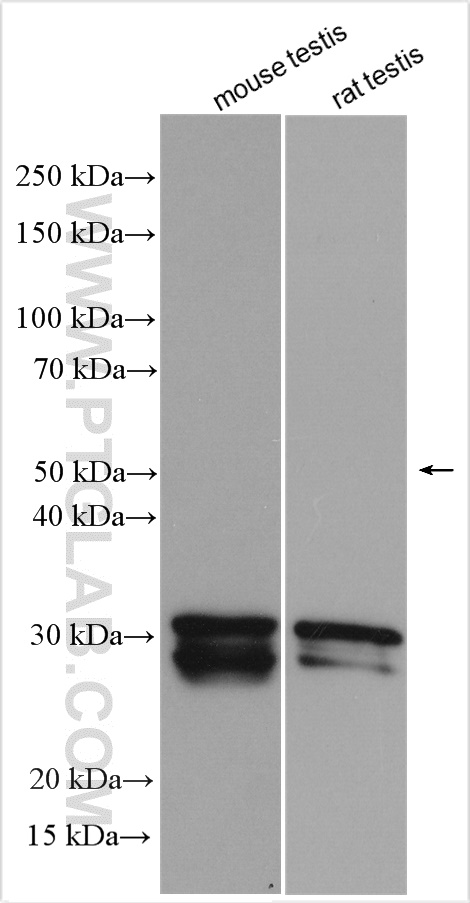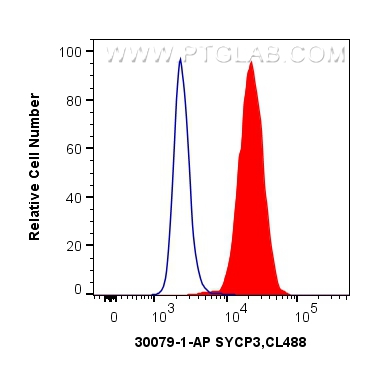验证数据展示
经过测试的应用
| Positive WB detected in | mouse testis tissue, rat testis tissue |
| Positive FC (Intra) detected in | Jurkat cells |
推荐稀释比
| 应用 | 推荐稀释比 |
|---|---|
| Western Blot (WB) | WB : 1:500-1:3000 |
| Flow Cytometry (FC) (INTRA) | FC (INTRA) : 0.40 ug per 10^6 cells in a 100 µl suspension |
| It is recommended that this reagent should be titrated in each testing system to obtain optimal results. | |
| Sample-dependent, Check data in validation data gallery. | |
发表文章中的应用
| IF | See 1 publications below |
产品信息
30079-1-AP targets SYCP3 in WB, FC (Intra), ELISA, IF applications and shows reactivity with human, mouse, rat samples.
| 经测试应用 | WB, FC (Intra), ELISA Application Description |
| 文献引用应用 | IF |
| 经测试反应性 | human, mouse, rat |
| 文献引用反应性 | mouse |
| 免疫原 | SYCP3 fusion protein Ag32466 种属同源性预测 |
| 宿主/亚型 | Rabbit / IgG |
| 抗体类别 | Polyclonal |
| 产品类型 | Antibody |
| 全称 | synaptonemal complex protein 3 |
| 别名 | SCP3, Synaptonemal complex protein 3, SCP-3, SCP 3, COR1 |
| 计算分子量 | 236 aa, 28 kDa |
| 观测分子量 | 27 kDa, 28 kDa |
| GenBank蛋白编号 | BC062662 |
| 基因名称 | SYCP3 |
| Gene ID (NCBI) | 50511 |
| RRID | AB_2935511 |
| 偶联类型 | Unconjugated |
| 形式 | Liquid |
| 纯化方式 | Antigen affinity purification |
| UNIPROT ID | Q8IZU3 |
| 储存缓冲液 | PBS with 0.02% sodium azide and 50% glycerol , pH 7.3 |
| 储存条件 | Store at -20°C. Stable for one year after shipment. Aliquoting is unnecessary for -20oC storage. |
背景介绍
SYCP3 is an essential structural component of the synaptonemal complex. This complex is involved in synapsis, recombination and segregation of meiotic chromosomes. SYCP3 is required for centromere pairing during meiosis in male germ cells. SYCP3 is also required for normal meiosis during spermatogenesis and male fertility. Mutations in SYCP3 are associated with azoospermia in males and susceptibility to pregnancy loss in females.
实验方案
| Product Specific Protocols | |
|---|---|
| WB protocol for SYCP3 antibody 30079-1-AP | Download protocol |
| FC protocol for SYCP3 antibody 30079-1-AP | Download protocol |
| Standard Protocols | |
|---|---|
| Click here to view our Standard Protocols |

